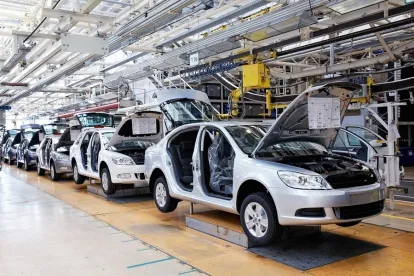After two years of litigation, Senate Bill 126, which amended New Hampshire’s Motor Vehicle Franchise Act — the so-called “Auto Dealer’s Bill of Rights” (codified at RSA 357-C) — has survived scrutiny by the New Hampshire Supreme Court. On December 29, 2015, the court affirmed the trial court’s decision that regulating farm, industrial, construction, forestry, and yard and garden equipment dealerships under the same statutory scheme as motor vehicle dealerships are regulated did not violate the Contracts Clause of the State or Federal Constitutions.
As a refresher, in July of 2013, New Hampshire enacted SB 126, which amended RSA 357-C by including “equipment” in the definition of “motor vehicle .” Under SB 126, “equipment” means “farm and utility tractors, forestry equipment, industrial equipment, construction equipment, farm implements, farm machinery, yard and garden equipment, attachments, accessories and repair parts.” RSA 357-C:1. SB 126 marked a radical change in the method of regulating equipment manufacturer/dealer relationships. For instance, it prohibits an equipment manufacturer from competing with a dealer, directly or indirectly through affiliates, except in limited circumstances. RSA 357-C:3, III. It also requires an equipment manufacturer to prove to the Motor Vehicle Industry Board that there is “good cause” for termination or failure to renew a current dealer, or appointment of a new dealer in an existing dealer’s territory, regardless of whether the existing dealer’s territory is non-exclusive. RSA 357-C:7, I(d)(1); C:9. These are requirements that actual motor vehicle manufacturers (like Ford and GM) have had to contend with for some time, but are brand new for equipment manufacturers. For that reason, SB 126 was challenged by equipment manufacturers the moment it was signed into law.
What Equipment Manufacturer’s Need to Know About SB 126
Legal challenges having essentially concluded in the recent Stihl, Inc. v. State of N. H. and Deere & Co. et al. v. State of N.H. decisions , here’s what equipment manufacturers should know.
SB 126 is retroactive, and therefore applies to existing dealer agreements, as well as future agreements. The primary challenge asserted by equipment manufacturers was that SB 126 unconstitutionally impairs existing contracts. Citing to the equipment dealer laws of several other states, the Supreme Court rejected this argument, holding that the purpose of SB 126 “to protect equipment dealers and consumers from perceived abusive and oppressive acts by manufacturers is unquestionably a significant and legitimate public purpose” and therefore survives constitutional scrutiny. Deere & Co. et al. v. State of N.H., N.H. (decided Dec. 29, 2015), at 10. “[E]liminating unfair methods of competition and deceptive business practices can foster ‘a salubrious and more stable business climate’” benefitting consumers and the state’s economy more generally. Id. at 12. That said, the court declined to second-guess the evidentiary predicate on which the legislature based its directive (that the relationship between car/truck dealers and manufacturers was identical to that of equipment dealers and manufacturers), or the legislature’s view as to the reasonableness or necessity of the law. Id. at 12-13.
However, SB 126 applies only to equipment with “an engine, wheels and transmissions” or attachments to such equipment. One argument made by the state that snapped under the weight of common sense was that the term “motor vehicle” as used in SB 126 included equipment like hand held tools, garden hoses, etc. According to the court, applying SB 126 to companies that do not make products akin to actual “motor vehicles” would produce “untoward outcomes.”
For example, under the state’s construction of the statute, a small company that makes only hand-held equipment, such as hammers, rakes, or garden hoses, and sells those products through dealers, such as hardware stores, would be regulated by the New Hampshire Motor Vehicle Industry Board (Board). See RSA 357-C:12, I (2009). Before being able to sell its products to a new hardware store, the company would be required to notify the board and any other dealers in such equipment located in “the relevant market area.” See RSA 357-C:9, I (Supp. 2014). If another dealer objected, the board could approve sales at the new location only after evaluating, among other things, “[w]hether the new [equipment] dealers of the same line make in that relevant market area are providing adequate competition and convenient consumer care for the [equipment] of the line make in the market area” and the “[g]rowth or decline in population and new [equipment] registration in the relevant market area.” RSA 357-C:9, II (Supp. 2014). We cannot imagine that the legislature intended for the board to make this type of evaluation concerning hand-held equipment, such as hammers, rakes, and garden hoses.
Stihl, Inc. v. State of N. H., 168 N.H. (decided Oct. 27, 2015) at 7-8.
Instead, the court agreed that “when the legislature moved RSA chapter 347-A into the motor vehicle provision, it intended to regulate only those manufacturers that produce equipment and related accessories that are analogous to automobiles, in that they have engines, wheels, and transmissions.” Id. Any other interpretation would lead to “absurd results.” Id.
Equipment manufacturers subject to the law should include broad arbitration clauses in their contracts with dealers. Finally, the court affirmed that SB 126’s provision declaring broad arbitration provisions to be an unfair business practice contradicted the Federal Arbitration Act, and therefore is preempted by the Supremacy Clause. See Deere & Co. et al., N.H. at 15-16. But the court punted on the question of whether a broad arbitration clause could require a dealer to submit a dispute to arbitration as opposed to resorting to the Motor Vehicle Industry Board. Given this, having broad arbitration language in dealer contracts is even more important; a manufacturer (especially an out-of-state one) would much rather have a neutral arbitrator decide a dispute than a state-run administrative board. Where there is a venue dispute, whether arbitration can be compelled will likely turn on justiciability.
In sum, SB 126 represents a further incursion into the relationships between equipment manufacturers and dealers to address “perceived” abuses by manufacturers. The court did leave open the possibility (theoretical) that the law could be struck down under the dormant commerce clause, but the likelihood of that happening is slim. Whether SB 126 represents the next step in the evolution of equipment dealer laws remains to be seen. Equipment manufacturers should pay close attention to upcoming legislative sessions, especially in the states in which they are based and have the best chance of being heard.





 />i
/>i

